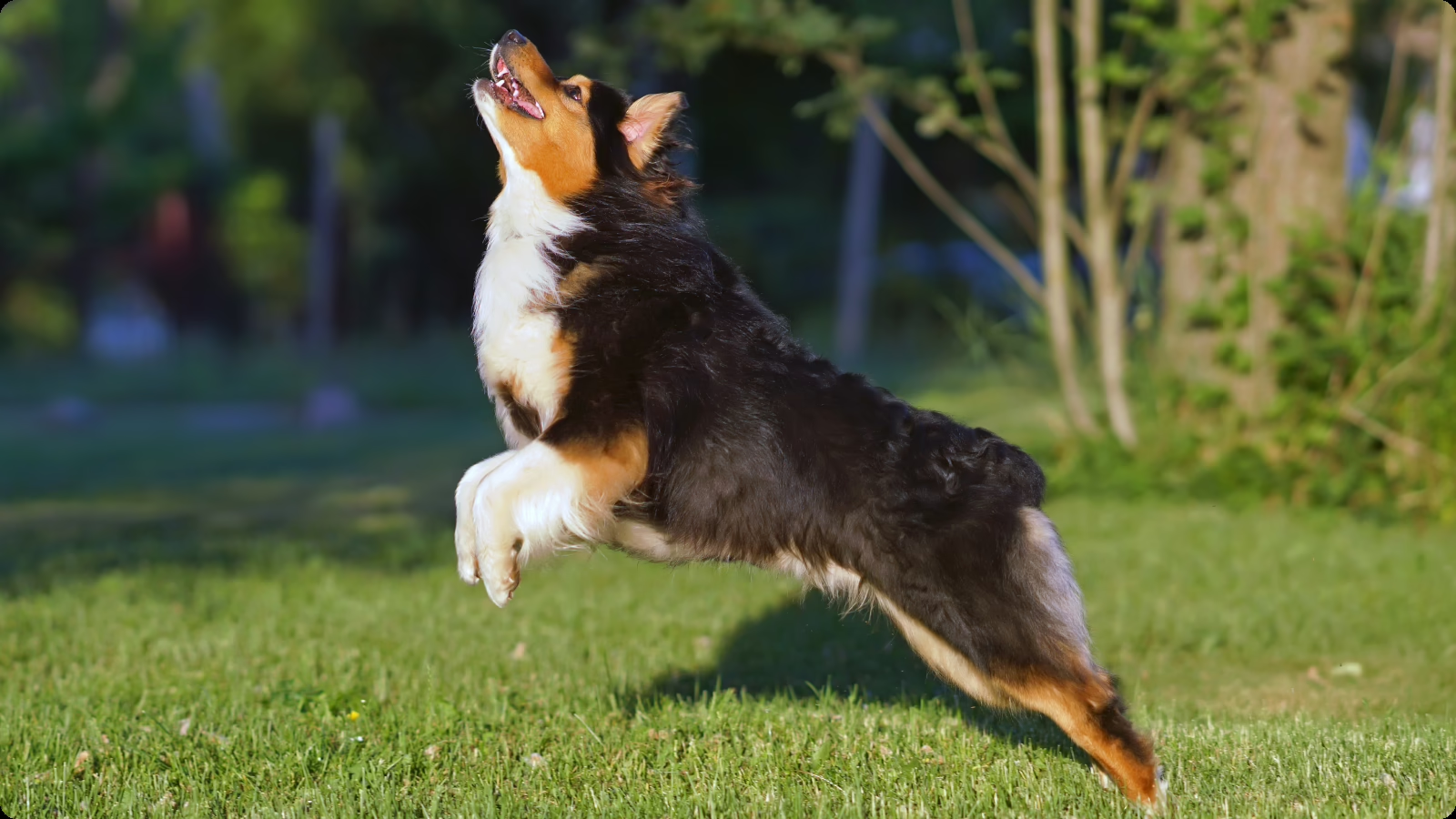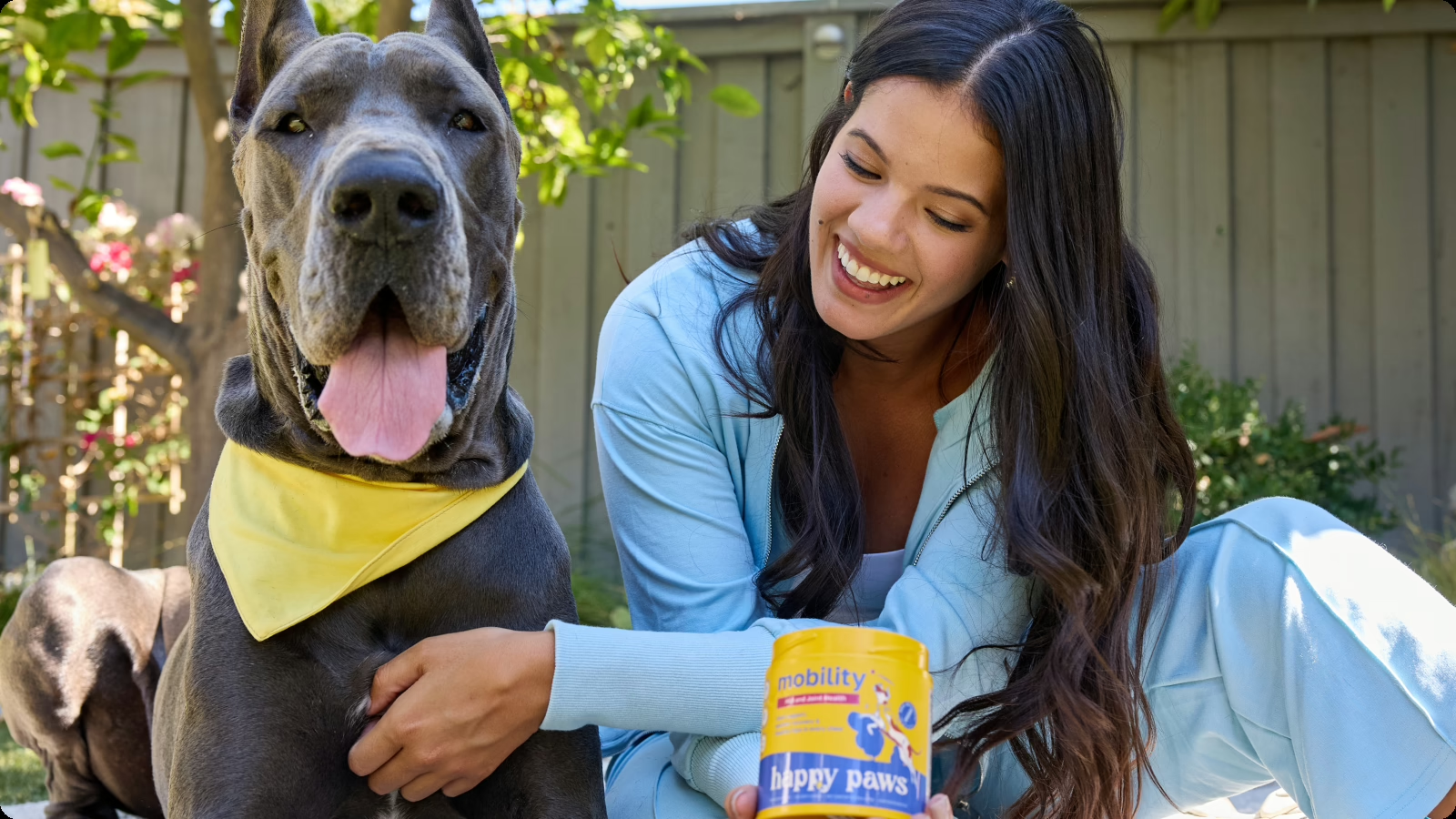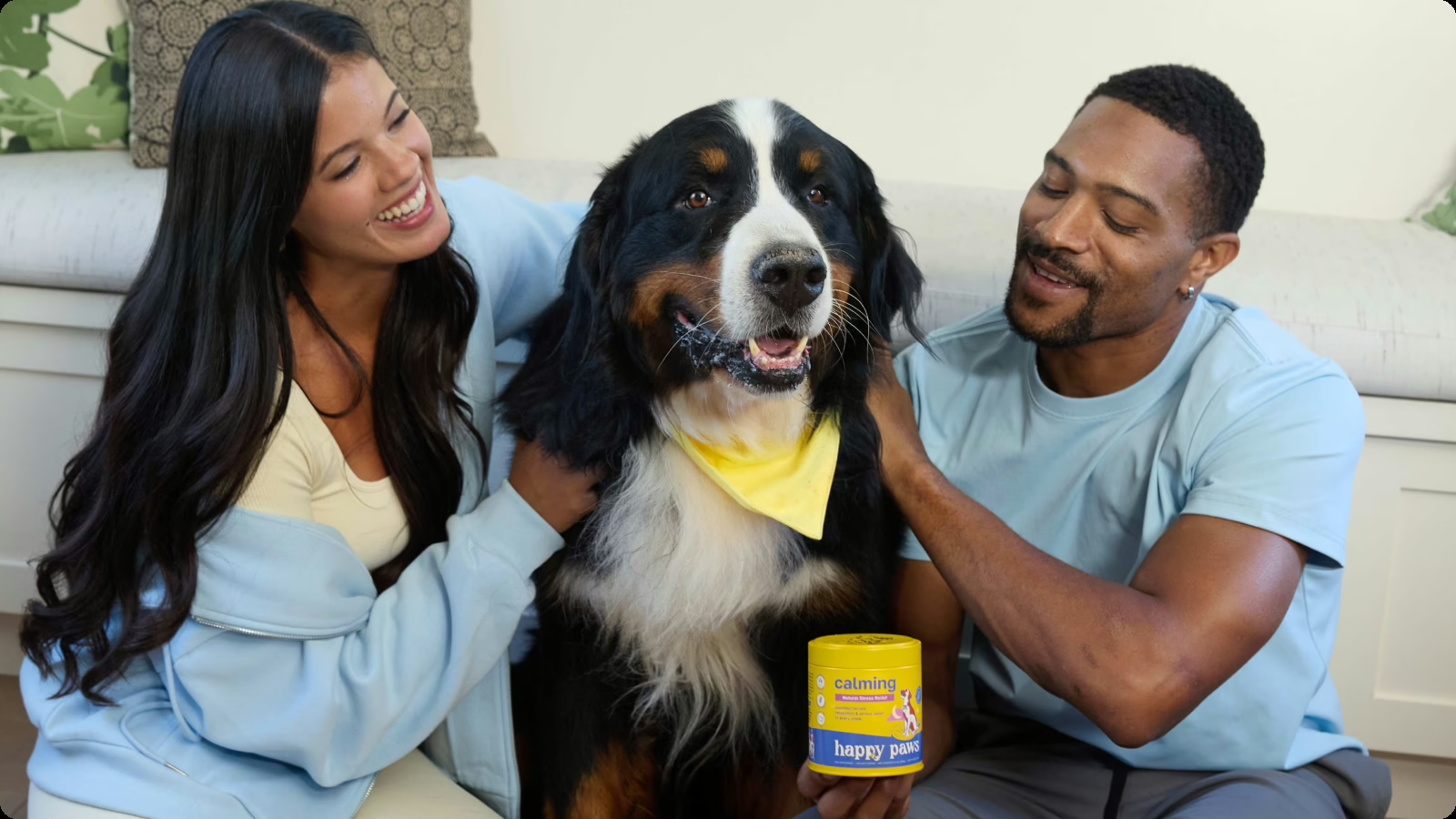The Jack of All Trades
With a name like “Rat Terrier,” the history of these small yet feisty dogs precedes them. After just an afternoon of work, these bite-sized, determined puppers could clear out a barn’s rat infestation, burrow out the stragglers, and settle down just in time for dinner. And yet, this breed is more than just a rat catcher. Over the years, Rat Terriers (affectionately called “Ratties”) have earned their place among other notable family dogs, thanks to their loyalty, high energy, and scrappy intelligence. These pups are deeply affectionate and stick to their owners like glue, making them a real B(F)FF (Best (Furry) Friend Forever).
At Happy Paws, we’re dedicated to helping all dogs, from purebreds to certified mutts, live their happiest, healthiest lives. We’ve designed our dog supplements to target a range of trouble spots in your dog’s health—many of which include common issues for a Rat Terrier.
In this article, we’ll explore the history of this lovable little Rattie, provide some information and advice on how to care for them, and help you decide which supplements are best for your new little shadow, the Rat Terrier.
Quick Facts
Origin: United States
Size: Small
Breed Group: Terrier
Lifespan: 13–15 years
Coat: Short hair—weekly grooming recommended
Temperament: Energetic, playful, determined & affectionate
Exercise Needs: The Rat Terrier is a high-energy breed that needs consistent, daily exercise to keep their body nimble and their intelligence sharp. These dogs pair well with most active lifestyles and enjoy long walks, short runs, or hikes through nature.
Training: Rat Terriers are deeply intelligent. They gravitate toward most types of training. Like other dog breeds, the Rat Terrier does best when training is introduced during the puppy stage. This helps them grow and stretch their minds. Proper training can help teach your Rat Terrier proper etiquette and allow them to flaunt their friendly side with kids and other dogs.
Dog Health: Small dogs, like the Rat Terrier, are susceptible to unique health conditions, like joint problems, dental dilemmas, digestive woes, and more.
Happy Paws for a Rat Terrier
Enrich your Rat Terrier’s health with high-quality, tasty supplements like these!
| Type of Happy Paws Supplement | Best for … |
| Calming Dog Chews | Settling your dog’s nerves. |
| Skin & Coat Dog Chews | Strengthening your dog’s coat & dermal health. |
| Dental Dog Chews | Fighting tooth decay & smelly breath. |
| 10-in-1 Multivitamin Dog Chews | Giving your pupper a daily dose of essential vitamins, minerals & other nutrients. |
| Hip & Joint Dog Chews | Soothing common symptoms of joint dysplasia & inflammation. |
| Probiotic Dog Chews | Restoring the healthy bacteria in your dog’s digestive system. |
Popular Supplements for a Rat Terrier
Rat Terriers are intelligent, energetic dogs that adjust well to most lifestyles. They can keep up with your active schedule while also being a patient couch companion. As long as they have you in their sights, they’re happy. But, like all dogs, Rat Terriers can face several unique challenges that dampen their health, affect their mood, and impact their overall well-being. Help restore that little pupper’s glow with healthy, tasty treats!
Our high-quality dog supplements use an array of all-natural, organic ingredients to enrich your dog’s physical and mental health. Here are a few dog supplements to help you care for your Rat Terrier.
Calming Dog Chews: Made with naturally calming ingredients, like tryptophan and chamomile, these Calming Dog Chews rely on healthy, high-quality elements to help settle your Rat Terrier’s nerves. It doesn’t take much to get this breed wired, so a simple, daily calming chew is all they need to relax and tap into their inner couch dog.
Skin & Coat Dog Chews: Our Skin & Coat Dog Chews help keep your Rat Terrier’s short coat healthy. These vegan, chicken-flavored soft chews use a blend of skin-supporting ingredients, like biotin and coconut oil, to restore dermal health and replenish your dog’s coat.
Dental Dog Chews: Like all dogs, Ratties are prone to smelly, unpleasant dog breath. Our Dental Dog Chews combine the refreshing aroma of spearmint with an enzyme blend to neutralize dental bacteria and curb stinky breath.
10-in-1 Multivitamin Dog Chews: Our 10-in-1 Multivitamin Dog Chews use multiple essential nutrients to strengthen your dog’s daily health and give them a well-rounded supplement. One vegan, lamb-flavored dog treat introduces ten critical nutrients to keep your dog healthy, happy, and active.
Hip & Joint Dog Chews: Soothe the symptoms of joint dysplasia with our Hip & Joint Dog Chews! Packed with a blend of joint-friendly ingredients, this dog supplement helps reduce inflammation and support joint health, thanks to compounds like glucosamine, chondroitin, and hyaluronic acid.
Probiotic Dog Chews: Made with powerful antioxidants, probiotics, and superfoods, our Probiotic Dog Chews help strengthen your dog’s digestive system, while supporting their gut and bowel health.
Common Health Concerns for Rat Terriers
Compared to other smaller dog breeds, the Rat Terrier is susceptible to unique health conditions like these:
Patellar Luxation: Patellar luxation occurs when a dog’s kneecap slips out of the joint. Keeping your dog at a healthy weight can help manage the condition, while joint-friendly supplements can help, too. If you believe your dog has patellar luxation, it’s best to speak with your veterinarian about first steps.
Digestive Issues: Digestive problems can develop in any dog at any age. Symptoms can include diarrhea, bloating, gas, low appetite, lethargy, and more. The issue can stem from the dog’s diet, lifestyle, or genetics.
Dental Dilemmas: All dogs are prone to stinky breath. Without the proper dental care, terriers can experience plaque build-up and odorous breath, which can lead to a number of issues down the road.
Separation Anxiety: Rat Terriers are a very loyal breed. So loyal, in fact, they may get a little tense and nervous when you leave them alone. Specific training can help massage the symptoms of separation anxiety, while natural calming supplements can be a reliable tool.
About Rat Terriers
As the story goes, Theodore Roosevelt needed to rid The White House of its rat infestation. Rumors of a specialized, rat-hunting breed were widespread. With a mix of Smooth Fox Terrier, Manchester Terrier, Whippet, Italian Greyhound, and Beagle, this breed was notorious for flaunting quick agility and unwavering determination. So, to see if the rumors were true, Teddy Roosevelt invited these little guests to the Oval Office. After just a short time, these tiny, work-happy dogs had cleared the West Wing of its rodent problem, made friends with diplomats, and restored order back to the Executive Office, earning the unambiguous name “Rat Terrier” from the 26th president himself.
Soon, Rat Terriers became a staple farm dog. Their small frame allowed them to venture into every nook and cranny, and their fierce tenacity earned them a glowing reputation. But with the advent of rat poison, Rat Terriers were promoted to a more domesticated role, thanks to their fun, lively personalities. Today, these dogs act as loyal companions for families and single pet-parent households.
Rat Terrier’s Temperament
Like other terrier breeds, Rat Terriers are fairly energetic. They cherish playtime that involves their tiny, intelligent minds. These dogs are quick-witted and never back down. They also have a fierce loyalty to their people. Once they latch onto you, they will work tirelessly to keep you in their sights. This little dog will be right by your side wherever you go, checking in and cheering you on. These dogs are the perfect running companion, hiking buddy, or backyard entertainer. After a long day, they become the quintessential couch cuddler.
How to Care for a Rat Terrier
Rat Terriers can make the perfect family dog, for the right family! These little fellas are affectionate and quickly form an irreplaceable bond with their people. Compared to other dogs, this terrier breed is relatively easy to care for. Here are a few tips to help keep your Rat Terrier happy, healthy, and lively, from their puppy years and well into their golden years.
Behavior Training
Behavior training helps establish the rules of the road for dogs—and it also helps your pupper show off their innate intelligence. Rat Terriers gravitate toward daily training. It helps them build a better bond with their owners and teaches them proper canine etiquette. Basic behavior training helps Ratties learn to manage their emotions and act appropriately when guests are over.
Early & Often Socialization
Socialization is when you introduce your dog to other dogs and people at a young age, as early as seven to eight weeks. Socialization during puppyhood helps your Rat Terrier meet new faces and get comfortable around strangers. Make socialization a weekly habit to keep your Rattie calm, cool, and relaxed around new friends.
Plenty of Exercise
You can use ample and often exercise to keep your Rat Terrier calm, cool, and collected indoors. They are professionals at tug-of-war, love accompanying you on hikes, and enjoy off-leash play in a fenced-in yard. Their small stature makes them easy to take with you and even easier to carry back, just in case they finally zonk out.
Happy Paws: High-Quality Dog Supplements
Keeping your dog happy, healthy, and active shouldn’t feel like a full-time job. At Happy Paws, we’ve designed our dog treats with the best ingredients and flavors possible (our dogs definitely approve!). We’ve made sure these treats are certified organic, non-GMO, and third-party tested for purity, letting you spoil your dog easily with healthy, tasty dog treats.
FAQ
Is a Rat Terrier a good family dog?
With their big-dog personalities in a little-dog body, Rat Terriers bring a ton of energy and attitude to your home. With the right training, they can make a great family dog. If they’re raised around cats, dogs, and children, Rat Terriers can behave appropriately. But little pets, like hamsters and Guinea pigs, may not fare well in a Rat Terrier household. These little critters may soon understand why these dogs have earned the name Rat Terrier.
Are Rat Terriers high maintenance?
When dogs are labeled as “high maintenance,” it’s usually because of their long, complicated coats or rough temperaments; Rat Terriers have neither. Their coat is short and only needs weekly brushes and monthly baths. And their temperament is easy-going. Yes, they’re high energy, but they also love to lounge like an unapologetic lap dog.
Do Rat Terriers shed a lot?
Rat Terriers have short coats that don’t shed much, though you may find little white hairs sprinkled about.
Do Rat Terriers like to cuddle?
Rat Terriers are deeply affectionate and cling to their person. So, you may find your Rattie snuggled under your covers or bundled up next to you.
Do Rat Terriers bark a lot?
With the proper training, Rat Terriers will only bark to alert their owner or get their attention.
Can a Rat Terrier stay home alone?
Rat Terriers are pretty energetic and sometimes needy, so they don’t love being left alone. You can use certain training techniques to help minimize separation anxiety, while also giving them all-natural calming dog treats to settle their nerves.
How do you give a Rat Terrier health supplements?
You can give your dog a Happy Paws health supplement in several ways. First, we’ve designed these supplements as dog treats, so you can give them to your pupper as a reward for good behavior. Or, you can add it to your dog’s kibble; they make a pretty tasty topper, too.





